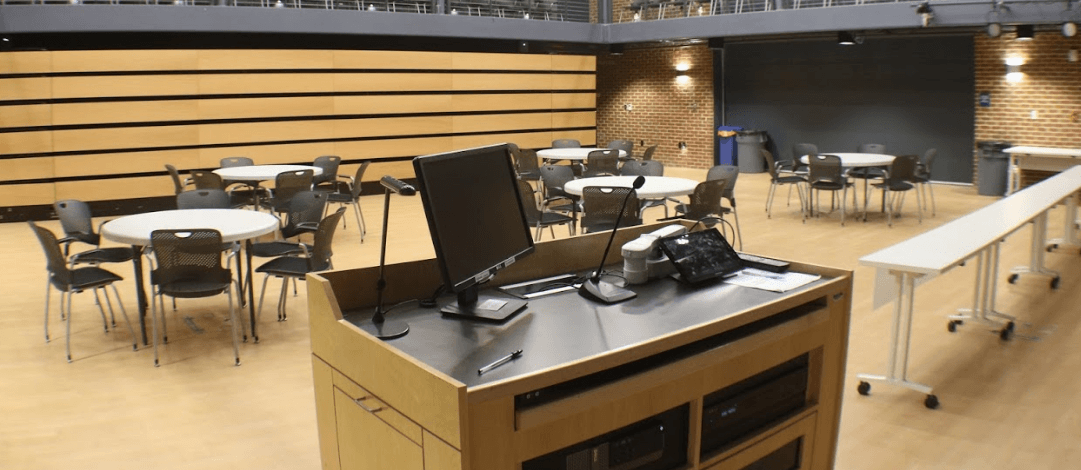University Faculty Council meeting proposes ideas for new class recording policy
4 min read
Glenn Taylor | The Blue & Gray Press
By MEAGHAN MCINTRYE
Students miss classes for many reasons ranging from sickness to dealing with personal issues. In situations when they cannot attend class, students tend to rely on professor’s office hours or notes from classmates in order to find out what they missed. However, a new way to obtain classroom material may become accessible to students soon.
On Wednesday, March 1 a classroom recording policy was proposed at the University Faculty Council meeting. It was brought up as a result of a staff member feeling there needs to be a policy that outlines acceptable student recording of class material. After being discussed in the University Faculty Committee, this idea was then sent to the University Faculty Affairs Committee.
While a specific policy has not been formed yet, the idea to create one stems from a variety of reasons, one of which involves whether or not professors have given approval about broader distribution of the material they lecture on. Different classes have different policies, however not all professors have always given approval about broader distribution.
Though the specifics for this policy have not been laid out, the members of the University Faculty Council are certain about two concepts. The first is that if a policy is created, nothing will change for students with accommodations who may already be allowed to record classes. The second, which is more of a concern, is if students use this opportunity as an excuse to skip class.
“There are concerns about this being used to replace class,” said University Faculty Chair Anand Rao.
Professors have expressed an understanding as to why students believe the ability to record lectures could be beneficial to their studies.
“I think it is completely reasonable for students to record lectures if they want to listen to them again or even to use and cite quotes in future papers,” said Janine Davis. “They should inform the instructor if they plan to record, though, and they should not share the recording publicly in other places, such as on YouTube.”
In classrooms where recording is allowed, students are encouraged to be careful about what they say.
“Classrooms are not public spaces in the same way that study and eating areas are—and in general people should be aware of what they say in common areas, because you never know who can hear, whether it’s a friend, future professor, potential student, or even a future employer,” Davis said.
For students, the ability to record classes is appealing as a way to guarantee they can get all of the necessary information.
“Students should be allowed to record lectures because not all teachers repeat themselves and others have heavy accents that are hard to understand,” said freshman business administration major Sean Silke.
Others believe that the ability to record lectures would help students to better be able to stay on top of information that is presented in class.
“It may assist students who cannot write notes as quickly or have a hard time keeping up,” said freshman environmental science major Mary Hoffman.
In some cases, it may be hard to see how it would be useful to record material and there are students who feel like it should still be an option.
“I don’t see any reason why students shouldn’t be able to record lectures,” said junior English major Bethany Johansen. “Some classes, I don’t think recording is beneficial, but in others I think it can be helpful.”
For some, recording seems like a useful option when it is difficult to write all of the information down.
“If you have a professor that doesn’t use PowerPoints or put slides up on canvas, and you can’t get all of the information down in a given time, then how else are you supposed to remember all of the information,” said freshman Alexis Erb.
While many students agree that recording should be allowed, their opinions about whether a policy should be campus wide or case-by-case differs.
“I think it should be campus wide no matter how the teacher feels,” said freshman psychology major Hanna Steinberger. “That way it doesn’t prevent students from being able to learn. What if there’s one teacher who’s like ‘I don’t like technology’ and it could hinder a student’s chance of learning. As long as the recording does not disrupt the class or teacher, it should be allowed.”
Others feel that recording should be determined by professor discretion.
“I personally believe recording in a classroom should be left up to the professor,” Johansen said. “I think they should be able to make their own choices depending on the atmosphere of their classes, and the professors comfort level.”
Students feel that if recording lectures can help them do well it should be allowed.
“[Recording] is supposed to benefit the students and the campus, as well as the teachers, should be striving for student success,” Erb said.


